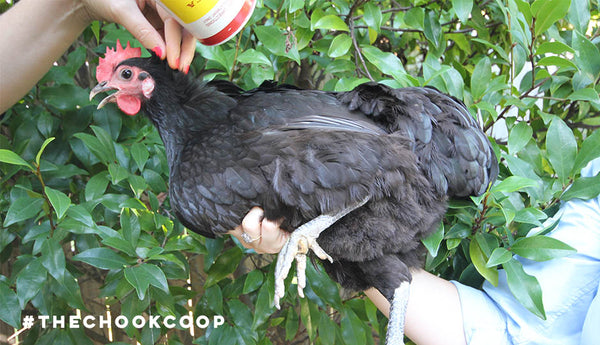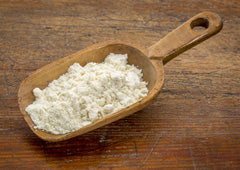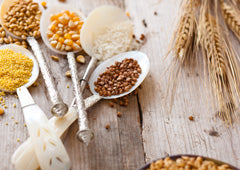
A chicken’s crop is a very important organ within their digestive system. Basically, the crop is a small pouch-like organ at the end of their esophagus. When looking at your chicken, the crop is located in the upper part of its chest. It is the first digestive organ to receive food. The function of the crop is twofold: think of your chook’s crop as a repository where all the food they take in goes to be stored and moistened until it is sent to either the proventriculus (the stomach) or the ventriculus (the gizzard). So, the crop is basically a store and sort facility. Because of the fact that birds in general have a very high metabolism, they need to consume more food in comparison to their body size and weight than most other animals. Enter the crop, a unique organ designed to store all of that egg-cess food a bird consumes until it’s time to move on further down the digestive tract.
The crop also plays a major role in protecting chooks that are particularly lower on the totem pole of the pecking order as it enables them to grab and go if need be.
All in all, the crop is a very capable cache.
What is a Sour Crop?
Sour Crop, also known as Candidiasis or Thrush, is a very common condition affecting backyard chicken flocks everywhere.
Normally, a chicken’s crop should be completely empty upon waking and greeting the sun each morning.
Sour Crop is an abnormality that occurs when a chicken’s crop fails to empty completely or it empties much too slowly causing food to remain stuck in their crop. Unfortunately, food that gets stuck in the crop begins to ferment or break down. Consequently, this produces an overgrowth of the Candida albicans yeast and results in a very unpleasant yeast infection.
Under normal conditions, the chicken’s digestive system is home to a multitude of beneficial micro-organisms that work to keep digestion running smoothly, as well as, some not so beneficial micro-organisms. The Candida albicans is one of these not so beneficial residents. And, because this particular yeast is commonly found inside a chicken’s digestive tract, there is a good probability that one or more of your fine feathered friends may develop Sour Crop at some point in your chicken keeping egg-sperience.
Symptoms of Sour CropSour Crop is recognizable by sight. A simple inspection of your chook’s crop first thing in the morning before your flock has commenced eating is the optimal time to look for crop abnormalities. The tell-tale sign of a Sour Crop is a noticeably swollen crop area. Also, by gently pressing on the chicken’s crop you will find that it feels soft and mushy and you will be able to hear the gurgling sounds of gases produced from the fermentation process. Be sure to be egg-stra gentle though, as your chook’s crop may be sensitive and sore.
As the name implies, this can be a sour scented pinch your nose kind of condition! Another tell-tale sign of a crop gone sour is odour - a chicken suffering from a Sour Crop may have “fowl” smelling breath. A quick peek inside the beak and you’ll be one step closer to a diagnosis.
However, if you are unable to catch your chooks before they've begun pecking at their tasty brekky, look for these other symptoms in any not so chipper chooks:
- May appear quieter than usual
- Drowsiness
- Sometimes will develop diarrhoea
- A loss of appetite
- Weight loss, if not diagnosed early on
What Causes Sour Crop in Chickens?
There are a handful of reasons why your chooks could develop Sour Crop...
The Crop is Emptying Slowly - Sometimes a chicken’s crop is just slow. This doesn’t necessarily mean that your chook will develop Sour Crop. Fortunately, a true Sour Crop takes some to develop due to the fact that the food needs time to ferment. This is egg-cellent news for backyard chicken keepers. This simple gift of time can make all the difference in the world - for you and your chooks.
The Result of Another Crop Abnormality – An Impacted Crop, as well as, miscellaneous crop abnormalities and malfunctions can cause Sour Crop. Sometimes organs just don’t work as they should.
A Recent Round of Antibiotics - Antibiotics can be both a blessing and a curse! When needed to help your beloved chooks recover from a bout with illness, antibiotics bless your flock with healing. However, sometimes a simple course of antibiotic use can interrupt the natural balance of micro-organisms inside the chicken’s digestive system and wreak havoc causing overgrowth of bacteria and yeast.
Infections and Other Diseases - Chickens with an internal infection are already ill and more susceptible to other conditions. Diseases such as Marek’s Disease, an easily transmitted virus that causes tumours in chickens of any age and Egg Peritonitis, the result of a horrid E. coli infection in a hen’s reproductive system cause a chicken’s digestive system to slow making it more prone to Sour Crop. Also, if chickens peck at objects that contain lead, it will slow down digestion and could cause poisoning depending upon the amount of lead ingested.
Worms - An infestation of worms causes BIG problems! Worms not only invade and infect a chicken’s digestive tract, but can prey on other areas of a chicken’s body such as the respiratory system, the reproductive organs, the trachea and even your chook’s eyes. Worms in the digestive tract irritate and disrupt the normal functions of the organs creating a Sour Crop friendly environment.
Injury - Even though chickens, as a group, are highly intelligent feathery creatures, their curiosity sometimes gets the better of them. This can and will get them into trouble! By adopting a “Don’t worry, beak happy!” attitude, they roam your backyard and peck at whatever catches their fancy. Sometimes, it’s an unsuspecting protein filled worm. Other times, it’s a shiny metal object which can mean a great big “ouchie” for their crop. When chickens unwittingly ingest a sharp object, it can injure their crops; thus causing further crop malfunctions.
In addition to the above named reasons, a variety of situations can cause a chicken’s crop to malfunction resulting in a Sour Crop. These can be as simple as changes in the type of feed, difficulty digesting a particular feed or more serious situations such as when an internal organ is failing or death is near. Sour Crop can also occur in conjunction with other illness such as Coccidiosis or Chlamydiosis.
Prevention and Treatment of Sour Crop

Even though Sour Crop is common among backyard chicken flocks, there are measures you can take to prevent the “sour” scent from “cropping” up in your chook’s crops. Prevention is always the best medicine! The following suggestions can all be easily incorporated into your regular chicken tending routine:
- Always provide your chooks with unlimited access to fresh clean water.
- Always allow chickens access to grit - it’s vitally necessary for breaking down food so it can be more easily digested.
- Perform regular crop check-ups-visually and physically if necessary.
- Add digestive system friendly herbs to your chicken’s feed-Bee Balm, Cayenne, Chamomile, Clover, Comfrey and Ginger help a chicken’s digestive system to do its job well.
- Keep worms at bay by regularly offering your flock anti-worm foods such as pumpkin seeds, garlic, nasturtiums, and catnip. Also, sprinkle some cayenne pepper on your chook’s feed. It’s sure to force any problematic parasites to wrinkle their teeny tiny noses and creep away... fast!
- Keep your backyard chicken habitat free from harmful objects that could injure your chook’s crop should they ingest it.
- Regularly adding Apple Cider Vinegar to drinking water aids in maintaining a balanced pH level inside a chicken’s crop which promotes a healthy, happy, well-functioning crop.
- Keep long or tough fibrous grasses and grains such as Wheat Grass, Mitchel Grasses, etc. cut low or block your chook’s access to them.
- Limit treating your chooks to starchy treats such as bread and pasta that may cause digestive struggles.
- Add probiotics to feed or water regularly!
Treating Sour Crop can be accomplished by simply massaging your chook’s crop area by gently rubbing the crop in an upward motion and offering olive oil via a dropper. Or, if this is does not produce any results, you can try picking up your chook and simply holding it upside down while you gently massage its crop (depending on the particular personality of the chook, this may be a two person job). This simple action causes any feed lodged in the crop to empty through the chicken’s mouth. Massage your chook’s crop, rubbing in an upward motion, for approximately thirty seconds at a time. If at first you don’t succeed... allow your weary feathered friend to rest a bit in between treatments if you need to repeat this procedure. Much to your chook’s dismay, you can safely repeat this maneuver several times to get as much gunk to come out of the crop as possible. When you feel satisfied that you’ve emptied the crop sufficiently, feel free to spend a little clucky quality time with your beloved chook-treat your fine feathered friend to some yummy “re-balancing the crop environment” yoghurt. Yoghurt is filled with beneficial probiotics to boost your chook’s immune system while it builds up her strength with a whopping dose of protein and essential vitamins. Definitely a win-win situation!
If, however, you are unable to empty the ailing chook’s crop after a few days of home care and treatment, please seek the help of your local veterinarian.
As chicken keepers, we like to think that we are doing the best we can for our girls, however, there is often more we can do to prevent health issues. With issues such as sour crop and salmonella, make sure that you've got the knowledge you need to raise a happy, healthy flock. Did you know 67% of chicken keepers surveyed experienced a chicken health or behaviour issue in the first 12 months that they didn’t know how to handle?
But don’t worry! Our feathered friends over at Chickenpedia have created a Chicken Healthcare Course. It is a comprehensive online course that covers everything you need, including what to look for in an unhealthy chicken and how to support your egg-laying hens to optimal health. All of their courses are really well structured and filled with vital knowledge, which is why I highly recommend them to all of my readers! From raising baby chicks to feeding to behavior, you’ll find valuable information that’ll give you the knowledge and confidence to successfully look after your chickens.
Check out Chickenpedia today and as a member, you will also get access to the ALL of their chicken courses!

















